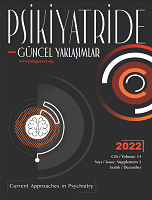Examination of the Role of Defense Mechanisms and Attachment Styles in Personality Disorder Beliefs among Nonclinical and Clinical Samples
Examination of the Role of Defense Mechanisms and Attachment Styles in Personality Disorder Beliefs among Nonclinical and Clinical Samples
Author(s): Yıldız Bilge, Nesrin Karamustafalıoğlu, Nihal Kanlısu, Aylin ÖzdemirSubject(s): Social psychology and group interaction, Personality Psychology, Clinical psychology, Behaviorism, Health and medicine and law
Published by: Çukurova Universitesi Tip Fakultesi Psikiyatri Anabilim Dalı
Keywords: Personality disorder beliefs; attachment styles; defenses mechanisms;
Summary/Abstract: Attachment styles, defense mechanisms, and the underlying personality disorders’ personality beliefs are considered to be closely related to psychopathology. The aim of this study is to compare the scores of attachment styles, defense mechanisms, and personality beliefs variables in a non-clinical group and a clinical group diagnosed with depression, obsessive-compulsive, and anxiety disorder and to examine the relationships between these variables. A total of 178 participated in the study, 59 of which were in the clinical group and 119 in the nonclinical group. The Personality Belief Questionnaire-Short Form (PBQ-SF), The Defense Style Questionnaire-40 (DSQ-40), and Relationship Scales Questionnaire (RSQ) were applied to the participants. Avoidant, dependent, passive-aggressive, obsessive-compulsive (OC), antisocial, schizoid, paranoid, and borderline personality belief scores were found to be higher in the clinical group, while mature defense scores were significantly higher in the nonclinical group. On the other hand, there was no difference between the two groups in terms of attachment styles. According to multiple linear regression analysis results, attachment styles and defense mechanisms predicted personality disorder beliefs in the range of 19.5% to 33.5% for the clinical group and 22.7% to 46.9% for the nonclinical group. In conclusion, the findings suggest that attachment styles and defense mechanisms may contribute to the understanding of the etiological causes of personality disorders and may be helpful in the treatment of personality disorders.
Journal: Psikiyatride Güncel Yaklaşımlar
- Issue Year: 14/2022
- Issue No: Suppl. 1
- Page Range: 37-45
- Page Count: 9
- Language: English

